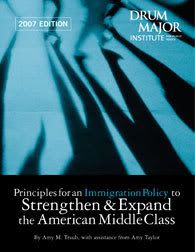DMI Releases New Report on Immigration Reform and the Middle Class
 The Drum Major Institute (DMI), the nations leading progressive think tank, today released a new and updated report on immigration reform and the middle-class, "Principles for an Immigration Policy to Strengthen & Expand the American Middle Class: 2007 Edition". The report looks at the effects of immigration on the middle-class and makes suggestions as to how best to advance a progressive immigration agenda that reflects the best interests of America's current and aspiring middle class.
The Drum Major Institute (DMI), the nations leading progressive think tank, today released a new and updated report on immigration reform and the middle-class, "Principles for an Immigration Policy to Strengthen & Expand the American Middle Class: 2007 Edition". The report looks at the effects of immigration on the middle-class and makes suggestions as to how best to advance a progressive immigration agenda that reflects the best interests of America's current and aspiring middle class.
The report argues that any debate over immigration policy must be connected to a larger conversation about America's squeezed middle class and those striving to attain a middle-class standard of living. DMI argues that any proposed immigration policy should be examined to ensure that its basic principles help to strengthen and expand America's middle class by making sure it bolsters—not undermines—the critical contribution that immigrants make to our economy and strengthens the rights of immigrants in the workplace.
With that in mind, DMI provides a two-part litmus test by which to evaluate any immigration policy by its impact on the middle class. Additionally, the report also includes a new section devoted entirely to guest worker programs and how they threaten the livelihood of American workers by sustaining an underclass of exploitable workers. Lastly, DMI looks at all the legislation proposed thus far and puts them to the "middle-class" test.DMI is excited to announce the release of our new and updated report two days after the Senate held its first hearings on immigration reform and just as Congress and advocates on all sides gear up for what has become a very divisive and not always educational debate. As elected officials, candidates for office and advocates are debating exactly how to best reform our immigration laws, we offer our report as a tool to encourage immigration reform that is progressive and has a positive impact on America's squeezed middle class. I know there are some who use xenophobia as a faux-populist economic policy but the truth is that there are many American workers who have legitimate concerns about the impact of immigration on their livelihoods. That is what our report addresses and is highlighted in DMI's immigration & the middle class talking points. DMI
DMI talking pointsBeyond data and research our report provides legislators, advocates and certainly the netroots with an important tool to analyze specific legislative proposals as they are introduced. Out of our analysis comes a two-part test that can be used to evaluate how legislation will impact middle-class Americans and those struggling to achieve a middle-class standard of living. In the legislative appendices we put our test to work by applying it to actual legislative proposals and we grade each bill by its impact on middle-class Americans.
Now you may not be a policy wonk. This policy paper was still meant for you! That's why we provide an online toolkit containing talking points, a discussion guide to facilitate conversations about immigration and the middle class and Spanish translations of the Executive Summary and the items above. If you are struggling over how to engage your apolitical roommate, your immigrant hating in-laws, your tone-deaf to framing activist friend or your union shop-steward about these issues-- these talking points are for you!
DMI's new immigration website is just a jumping off point for the debate. Join us for ongoing discussion on the DMIBlog - like our series of posts on every Presidential candidate's stance on immigration. Immigration reform policy could be a huge win for Americans AND for immigrants - or it could be a huge failure. The public's participation in that discussion and understanding of the issues will be key to a progressive success.
DMI
For more information see:
Executive Summary
DMI Immigration and the Middle Class Toolkit
tags: immigration, report , DMI, immigration and middle class

































No comments:
Post a Comment